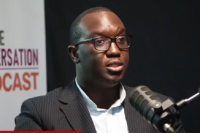Selective application of the law is something that our law enforcement agencies take so casually in Zambia. But it is a very serious matter with dire consequences on society and the economy. Everything that we are experiencing today as a country, all the economic woes, can be linked to the selective application of the law and the corruption that comes with it.
When you have two thieves, an influential one with government connections and another who is a street hustler, and you pursue the latter leaving the influential thief untouched, you have already defeated the course of justice. You may have a very good case against the street thief and sail through the prosecution process, but the fact that you were selective in the process of deciding whom to investigate, arrest and prosecute is enough to render you an unprofessional law enforcement agency. In fact, you cease to be a law enforcement agency, you remain a political attack dog.
We can add that when investigative wings operate with fear when it comes to dealing with politically-exposed persons, criminals with State power and influence, they immediately become accomplices to those crimes. Being an accomplice to a crime does not stop at participating, it includes watching and doing nothing about it.
Now, we are not calling anyone a thief, but what happened last week in the case of the famous Bugatti and the businessman who imported the super car is a typical example of what we are trying to point out. The Drug Enforcement Commission (DEC) seized the car on suspicion that there was money laundering involved. We were told that the grounds for this seizure of property was that the Commission had received numerous concerns from members of the public regarding the Bugatti and they were carrying out an investigation to ensure that the car was not purchased from proceeds of crime.
First, it must be pointed out that no one wrote to the Commission complaining about this car. The DEC is free to challenge us by producing evidence to the contrary. What prompted DEC to do this was the social media euphoria they saw. Now, people are asking, how many concerns and complaints of suspicious property have been made by the public before? How many of those properties linked to political figures has the DEC acted upon? How did the Law Enforcement Agency, so swiftly, manage to find the owner of one unregistered mobile property, but could not find the owner of 48 occupied stagnant flats that pay land rates, Zesco bills, etc? DEC needs to explain their interest here.
Secondly, we can almost bet anyone that the DEC did not carry out any thorough money laundering investigation around this car before releasing it. Again, they are free to prove us wrong by producing a report of their findings. We say this with confidence because the same DEC has told us in the past that money laundering investigations take a long time, sometimes even years. But this Bugatti money laundering investigation took only a couple of hours. How feasible is that? The same DEC has also told us in the past that they first investigate before seizing a property, but in this case, they first seized while looking for what to investigate. It’s like your employer firing you because you dress too smartly, so that they can investigate where you get your money from. Our educated guess is that the same social media hype that led DEC into seizing the car also forced them to release it. And therein lies the embarrassment!
When you lose the sense of shame, you are bound to destroy yourself. Shame is a very important feeling in an individual’s life, and this includes institutions and those who lead them. It helps in keeping one’s moral standing upright. When you get to a point of accepting that “ifwe twalisebana kale, tulundapofye”, then you have become a danger on yourself and the people around you. Our Drug Enforcement Commission should not lose the sense of shame.
We have nothing against the Commission and we understand the difficult circumstances under which they operate, the political pressure they face when dealing with the high-profile cases that the general public look forward to. But that is where integrity comes in; stars and achievers are born out of doing something extraordinary. If DEC would like to rebuild the lost public interest, they must begin to work in public interest and not under political influence. If those in power cannot let you operate with autonomy, there is an option of resigning, and the public will appreciate you.
Our opinion is not targeted at the Drug Enforcement Commission alone. We are also talking to the police, the Anti-Corruption Commission and the Zambia Revenue Authority. Law enforcement should not be selective. It is very disturbing, for example, to hear that the Revenue Authority has unearthed a multi-million dollar smuggling scam, but the institution doesn’t want to announce the investigation to the public as they always do. Yet when another company that has no links to the corridors of power is involved, they shout out loud for everyone to know! That is unfair. It defeats the course of justice. It means you are protecting certain institutions in which you have an interest, while condemning the rest to the court of public opinion.
Arresting a criminal is a good thing, but if you only arrest those who don’t share the proceeds with you, then you are worse criminals because more is expected from you.












